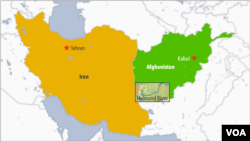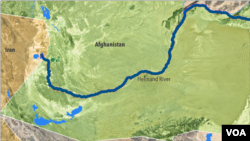After weeks of tensions over water rights to the Helmand River that escalated to a deadly clash last week, Iran says it has made progress in negotiations with Afghanistan’s Taliban rulers over the shared waterway.
On Thursday, Iranian Foreign Minister Hossein Amir Abdollahian told Iranian state media, the Islamic Republic of Iran Broadcasting, that his government had “good negotiations” with the Taliban.
“We have the water rights issue on the agenda, and the [Iranian] president has assigned Hassan Kazemi Qomi [Iranian ambassador to Afghanistan] to follow up on the matter, with the view that the issues between the two countries should go in the direct direction and be resolved,” said Amir Abdollahian.
The tensions between Iran and the Taliban escalated after Iran accused the de facto government of Afghanistan of restricting the flow of water to Iran.
Deadly clashes between the two sides broke out last week in which two Iranian security forces and a Taliban guard were killed.
The tensions began last month after Iran President Ebrahim Raisi warned the Taliban to "honor" Iran’s rights over the Helmand River.
“We will not allow the rights of our people to be violated,” Raisi said during his visit to the southeastern Iranian province of Sistan and Baluchestan on May 18, adding that the Taliban should take his words "seriously."
Afghanistan Acting Foreign Minister Amir Khan Muttaqi said that the Taliban were committed to the 1973 water treaty between Afghanistan and Iran. But he added that “the drought in Afghanistan and the region should not be overlooked.”
“It has become a completely political issue in both Afghanistan and Iran,” said Fatemeh Aman, a senior fellow at the Middle East Institute.
Longtime issue
Aman said the water dispute “existed, and it goes back over centuries.”
“The problem is that the issue just went away whenever there was enough rain or water. But the issue surfaced once there was a drought or lack of rain.”
In 1973, Iran and Afghanistan signed the Helmand River Water Treaty. According to the treaty, Afghanistan should provide 850 million cubic meters of water to Iran from the Helmand River in a "normal" year.
Kazemi Qomi said that despite the treaty, Iran has received only about 4 percent of its share of water.
The Helmand River, the longest river in Afghanistan, is about 1,150 kilometers (715 miles) long. Constituting over 40 percent of Afghanistan’s surface water, the river is an important source of livelihood for the country’s southern and southwestern provinces.
It feeds Hamun Lake in Iran’s Sistan and Baluchestan province, the province's main water source.
Persistent droughts, climate change and a lack of proper water management have brought tensions over the transboundary waters between the two neighbors.
Although water security frictions are increasingly common for nations with shared waterways, it is unclear how much the dispute between Iran and Afghanistan could escalate.
Michael O’Hanlon, director of research at the Brookings Institution, told VOA that he did not expect tensions between Iran and Afghanistan to “boil into a larger problem for the region.”
“I think what you are looking at is really a question of how much will they cooperate on issues that they have a common interest in, like border control, counternarcotics, issues like that, where you could see the cooperation,” O’Hanlon said.
‘Complicated’ relations
During the civil war in Afghanistan in the 1990s, Iran supported the Afghan forces fighting against the Taliban, particularly after the Taliban killed nine Iranian diplomats in the northern city of Mazar-e-Sharif in 1998.
Iran cultivated closer relations with the Taliban before the fall of Kabul, as both sides were united in opposition to U.S. forces in the region.
While Iran has not recognized the Taliban as the legitimate government of Afghanistan, it has handed the Afghan Embassy in Tehran over to the group.
Despite close diplomatic ties, skirmishes over the border have been reported in recent years.
Ryan Crocker, a former U.S. ambassador to Afghanistan, told VOA that the relations between Iran and the Taliban “are very complicated.”
“The last thing that this region needs to see some kind of border war between Iran and Afghanistan,” he said.
This story originated in VOA’s Afghan Service.








